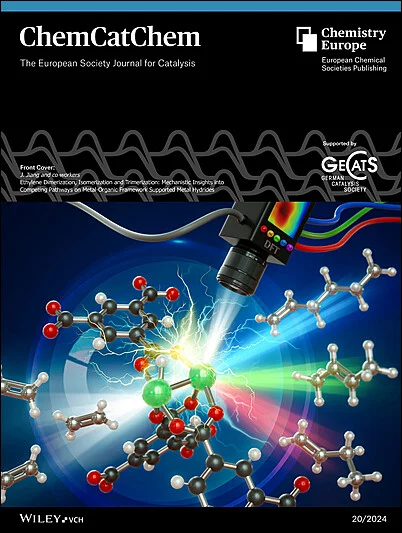均相 Mn(I) 加氢催化中抑制路径的浓度热力学
IF 3.8
3区 化学
Q2 CHEMISTRY, PHYSICAL
引用次数: 0
摘要
许多催化反应都存在产物抑制现象,由于催化剂的抑制态和活性态之间的比例关系,这种现象在均相加氢反应中尤其难以控制。我们最近报告了锰(I)加氢反应中的一个此类途径,并证明添加氧化烷基可以影响该反应的热力学有利性,并选择性地抑制产物抑制。由于外部反应促进剂在形式上不参与反应热力学,我们开始研究这些明显的环境效应背后的分子相互作用。在这里,我们揭示了抑制过程的热力学图谱与碱浓度呈现非单调依赖关系。我们将这一现象与在不同碱浓度下运行的两种主导机制联系起来。具体来说,在低浓度促进剂条件下,碱添加剂可增强离子强度并降低抑制状态的自由能。在碱浓度较高时,我们认为会形成高度易溶的醇-氧化烷团簇,从而稳定游离醇,使其不利于加入催化剂,从而抑制抑制作用。反应物与反应环境之间的这种非共价相互作用虽然相对较弱,但却能对催化过程的自由能产生重大影响,最终决定催化过程的命运。本文章由计算机程序翻译,如有差异,请以英文原文为准。
Concentration‐Dependent Thermodynamics of the Inhibitory Paths in Homogeneous Mn(I) Hydrogenation Catalysis
Many catalytic reactions suffer from product inhibition, which especially hard to control in homogeneous hydrogenation due to the scaling relation between the inhibited and active states of the catalyst. We recently reported one such pathway in Mn(I) hydrogenation and demonstrated that addition of alkoxide bases could affect the thermodynamic favorability of this reaction and selectively suppress the product inhibition. Since external reaction promotors are formally not involved in reaction thermodynamics, we set to investigate the explicit molecular interactions behind these apparently environmental effects. Herein, we reveal that the thermodynamic landscape of the inhibitory process exhibits a non‐monotonic dependence on the base concentration. We related this phenomenon to the presence of two dominant mechanisms operating at different base concentrations. Specifically, the base additives can enhance the ionic strength and lower the free energy of the inhibited state at low promotor concentration. At high base concentrations we suggest the formation of highly labile alcohol‐alkoxide clusters which stabilize the free alcohol and make its addition to the catalyst unfavourable, thereby suppressing the inhibition. While relatively weak, such non‐covalent interactions between reactants and reaction environment can cause substantial perturbations to the free energy of catalytic process, ultimately deciding its fate.
求助全文
通过发布文献求助,成功后即可免费获取论文全文。
去求助
来源期刊

ChemCatChem
化学-物理化学
CiteScore
8.10
自引率
4.40%
发文量
511
审稿时长
1.3 months
期刊介绍:
With an impact factor of 4.495 (2018), ChemCatChem is one of the premier journals in the field of catalysis. The journal provides primary research papers and critical secondary information on heterogeneous, homogeneous and bio- and nanocatalysis. The journal is well placed to strengthen cross-communication within between these communities. Its authors and readers come from academia, the chemical industry, and government laboratories across the world. It is published on behalf of Chemistry Europe, an association of 16 European chemical societies, and is supported by the German Catalysis Society.
 求助内容:
求助内容: 应助结果提醒方式:
应助结果提醒方式:


